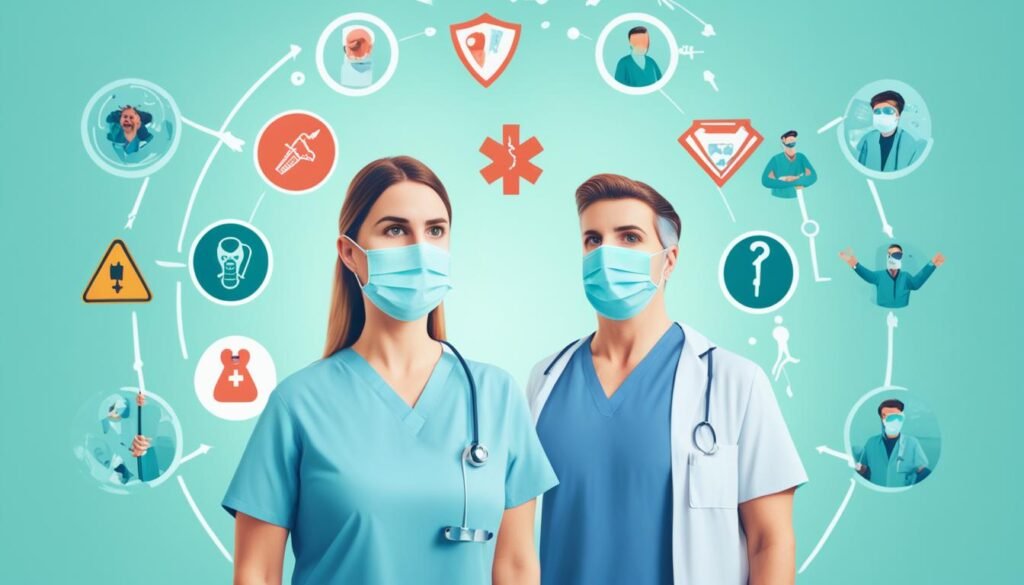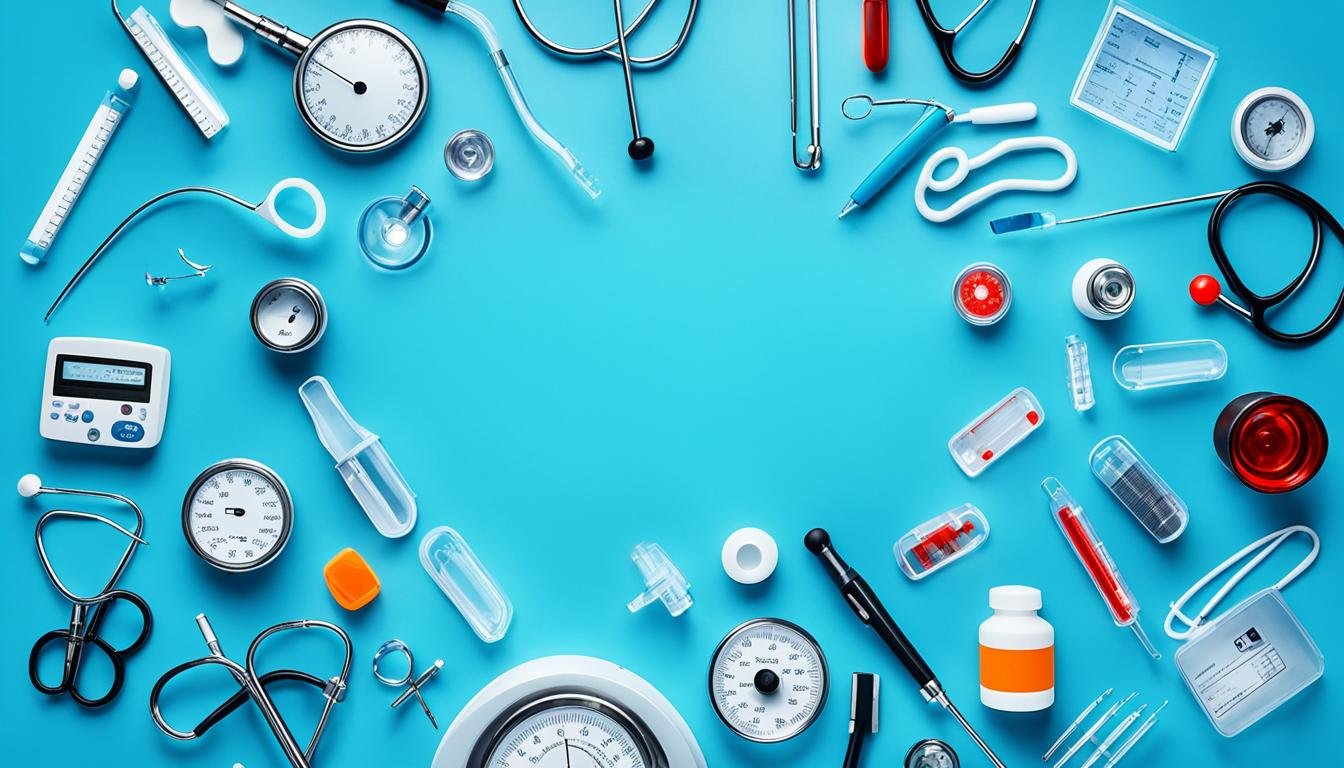Medical conditions cover many health issues and illnesses. Do you really understand these threats to your health? Are you able to spot their signs, check treatments, and keep well?
Do you wonder about a certain condition or just want to learn more? This article aims to give you key info. It will help you grasp medical conditions better and take charge of your health.
Key Takeaways:
- Medical conditions encompass a wide range of health concerns, disorders, ailments, illnesses, symptoms, syndromes, and diseases.
- Understanding the symptoms of medical conditions is crucial for early identification and intervention.
- Knowing about the available treatments can help you make informed decisions about your health.
- Effectively managing your health involves lifestyle changes and regular medical care.
- Stay informed and empowered by gaining the essential knowledge about medical conditions.
Finding Reliable Health Information Online
Finding good health info online is key for smart choices. There’s a lot out there, but not all of it’s true. By sticking to a few tips, you can find the trusty stuff.
Evaluating Websites for Reliable Health Information
Start with sites run by the government. Places like the NIH and CDC give the latest and most accurate info. They work for public health and know their stuff.
Also, check out what hospitals, health groups, and schools say. They have pros who keep info correct and current.
When looking at a site, see what its main goal is. Is it to teach or to sell you stuff? Real info sites just want to educate you without pushing products.
Check who runs the site, too. Stick to those run by big, respected names. They should tell you about the people who wrote the info. This shows they’re serious and have the right knowledge.
How often a site checks and updates its details is crucial, too. It should spell out how they make sure info is true. If they base things on facts and always check what they say, you can trust it.
And don’t forget about keeping your info safe. Good sites care about your privacy. They should let you know how they keep your info secure.
Trustworthy Websites for Reliable Health Information
These websites are great for finding reliable health info:
- National Institutes of Health (NIH) – www.nih.gov
- Centers for Disease Control and Prevention (CDC) – www.cdc.gov
- Mayo Clinic – www.mayoclinic.org
- WebMD – www.webmd.com
- Harvard Health Publishing – www.health.harvard.edu
Medical Conditions and COVID-19 Risk
Today, knowing how certain illnesses can make COVID-19 more dangerous is very important. People with cancer, kidney disease, liver disease, and lung problems have a higher risk of getting very sick.
Cancer patients are in more danger because their immune system is weak. Cancer treatment can also lower their ability to fight off infections, like COVID-19. They should always listen to their doctor and take steps to stay safe.
If you have kidney or liver disease, you may get very sick from COVID-19. Your body might not be able to fight the virus well. It’s key to manage your health conditions well by keeping up with your doctor and taking your prescribed medicines.
People with lung diseases, such as asthma or COPD, are also at a higher risk. These diseases can make COVID-19’s breathing problems worse. Watching your health closely, taking your medicine, and following safety steps are crucial for lowering your risk.
“People with cancer, kidney disease, liver disease, and lung problems face a higher risk from COVID-19. They need to be extra cautious and manage their health well during this time.”
Knowing the risks helps everyone stay safer. If you have these health conditions, protect yourself by following safety tips. Wash your hands, wear a mask, keep your distance, and get the vaccine when it’s your turn.
It’s also crucial to keep talking to your doctor. Regular check-ups, phone calls, and being honest about how you feel are important. This helps in managing your condition as best as possible.
By learning more about the risks, we can all help keep each other safe. We must take care of those who are more vulnerable. Together, we can lessen the effect of COVID-19.
Precautionary Measures for Individuals with Medical Conditions
If you have a medical condition, you can protect yourself from COVID-19 by:
- Following preventive guidelines such as hand hygiene, mask-wearing, and social distancing
- Adhering to your prescribed medications and treatment plans
- Maintaining regular communication with your healthcare providers for updates and guidance
- Ensuring you have access to the medical supplies and medications you need
- Staying up-to-date with credible information from trusted sources
- Considering getting vaccinated when it’s recommended
These steps are very important for your safety. Stay informed and take care of yourself and others during this difficult time.
Medical Conditions and COVID-19 Risk (Continued)
Some medical conditions raise the risk of severe COVID-19 illness. These include cystic fibrosis, dementia, diabetes, and heart conditions. Also, disabilities and HIV infection can put individuals at higher risk. This means they might get very sick if they catch the virus.
People with cystic fibrosis, a disease of the lungs and digestive system, need to be careful. The mucus in their bodies is thick and sticky. This can block their airways, making it tough to remove the virus.
Dementia makes it hard for people to remember safety measures against COVID-19. Those around them, like caregivers and doctors, must help keep them safe. This is by making sure they follow the right steps.
Diabetes, a disease that affects blood sugar, is another concern. If someone with diabetes gets COVID-19, they might have more health problems. They should check their blood sugar often and keep their health in good shape.
Those with disabilities might find it difficult to protect themselves from the virus. It’s important to make sure they can get the healthcare and info they need. That way, they can stay as safe as possible.
Heart problems also raise the risk. People with these conditions should be on top of their health. They should take their medicine and do what they can to avoid getting sick.
HIV makes fighting off other illnesses harder, including COVID-19. People with HIV should keep taking their medicines. They should discuss any concerns with their healthcare team.
“It’s key for those with certain health issues to be extra careful with COVID-19. Working with doctors is vital. They can offer advice tailored to each person’s needs.”
For more details on these risks, see the table below:
| Medical Condition | Risk for Severe Illness from COVID-19 |
|---|---|
| Cystic Fibrosis | Increased risk due to impaired lung function and vulnerability to respiratory infections |
| Dementia | Higher risk due to challenges in following preventive measures and potential difficulty in accessing healthcare |
| Diabetes | Elevated risk due to compromised immune system and potential for more severe complications |
| Disabilities | Increased vulnerability due to potential difficulties in accessing necessary healthcare, information, and resources |
| Heart Conditions | Higher risk due to compromised cardiovascular health and potential for more severe illness |
| HIV Infection | Heightened susceptibility due to compromised immune system and potential for more severe outcomes |
If you have these medical conditions, stay alert. Follow the prevention steps closely. These include handwashing, wearing masks, and keeping your distance from others. Listen to advice from healthcare experts. Keep in touch with them for the latest tips.
Medical Conditions and COVID-19 Risk (Continued)
It’s key to know the extra risks some health conditions can bring during the COVID-19 pandemic. People with weak immune systems, like those after cancer treatments, or taking specific drugs are more at risk. So are those who have had organ transplants.
Having mental health issues can also make COVID-19 more dangerous. It’s crucial for these folks to keep healthy and lower stress. This helps them fight off the virus better.
Being overweight or not being active can up your COVID-19 risk too. It’s important for these people to eat well and exercise to strengthen their body against the virus.
Expecting mothers should also be careful. Even though we’re still learning about it, it seems pregnancy might raise the risk of severe COVID-19. So, pregnant women must be extra cautious.
If you’re in any of these groups, take special care to protect yourself. That means washing your hands a lot, wearing a mask, and keeping your distance from others. Listen to what health experts say too.
Staying informed and looking after your health is vital if you have these conditions. Being proactive can help keep you safe from the virus.
Everyone needs to work on managing risks and preventing the disease, no matter their health. Following health advice and staying up-to-date helps us all. Together, we can beat COVID-19.
Medical Conditions and COVID-19 Risk (Continued)
Some people with specific health problems might get very sick if they catch COVID-19. It’s very important for them to know they’re at higher risk. They should take extra care to protect themselves.
Sickle Cell Disease
COVID-19 poses a greater threat to those with sickle cell disease. This blood disorder changes the shape of red blood cells, hampering their ability to carry oxygen. This can lead to blockages in blood flow and affect the body’s oxygen supply.
Smoking
Smoking harms the immune system and lungs. This makes smokers more likely to get very sick. If they catch COVID-19, they could face worse symptoms, like a higher chance of getting pneumonia.
Solid Organ or Blood Stem Cell Transplant
People who had a solid organ or blood stem cell transplant take drugs that lower their immune system. This puts them at a higher infection risk, including COVID-19.
Stroke or Cerebrovascular Disease
Having had a stroke in the past raises the risk of serious COVID-19 illness. Stroke survivors might have weaker immune systems. They could also have other health problems that make them more likely to get severe complications.
Substance Use Disorders
Those with substance use issues, such as alcohol or drug abuse, are at risk. Their immune and respiratory systems may be weakened. It’s critical for them to get the medical help they need.
Tuberculosis
TB patients have a harder time fighting COVID-19. The infection weakens their lungs, making them less able to battle new respiratory infections. This raises the chance of severe illness from COVID-19.

Knowing about these risks is key to staying safe from COVID-19. With the right care and precautions, it’s possible to lower the risk of severe sickness. It’s all about protecting your health and well-being.
Importance of Reliable Health Information and COVID-19
Access to correct and reliable health info is key during the COVID-19 pandemic. It helps us make smart choices for our health and safety. With false details spreading quickly, it’s crucial to only trust facts from solid sources.
Knowing the right info about COVID-19 lets us understand its effects. We learn about its symptoms and how to stop it from spreading. It also shows us why getting vaccinated is important.
“The availability of accurate health information empowers individuals to make informed choices and promotes overall public health and safety.”
Good health info guides us through the pandemic and its risks, especially for those with health issues. It shows how people with certain health problems can stay safe.
Staying updated with the latest COVID-19 news and treatments is vital. This knowledge gives us power to mind our health wisely. It also helps us work with doctors for the best care.
To get the best info, turn to trusted sources like official health sites and top medical groups. They offer the latest facts and tips. This helps us stay confident.
By knowing the right facts and acting on them, we all help stop COVID-19. We protect our health, our loved ones, and our wider community.
Key Takeaways:
- Accurate health info is a must in the COVID-19 pandemic.
- Listening to experts helps us make wise choices.
- It’s important to know how COVID-19 affects different health issues.
- Understanding the latest news and cures is crucial.
- Trusted sources ensure you get the right and new info.
- By being well-informed, we all work against COVID-19.
| Benefits of Reliable Health Information and COVID-19 | How to Stay Informed |
|---|---|
| 1. Accurate understanding of COVID-19 symptoms | 1. Follow reputable government health agencies |
| 2. Awareness of preventive measures | 2. Seek information from renowned medical institutions |
| 3. Knowledge of COVID-19 vaccination significance | 3. Access established healthcare organizations |
| 4. Understanding the impact on individuals with pre-existing conditions | 4. Join reliable online health communities |
| 5. Latest updates on COVID-19 research and treatments | 5. Consult healthcare professionals for personalized advice |
Health Conditions and Medical Apps
Medical apps are great for people with health issues. They make life better and healthier. These apps help watch your health, give important info, and encourage good actions.
They can track what you eat and how much you move. This shows you what’s in your food and if you need to change. Seeing your workouts helps set fitness goals.
These apps let you check lab results from home. This makes managing your health easier. You can be more in control of your care.
![]()
They’re also good for keeping an eye on health problems. If you have diabetes or high blood pressure, you can track key info. You and your doctor can work on a detailed care plan together.
They remind you to take medicine and keep up with exercise. These keep you focused and make sure you don’t forget important health steps. They also remind you of medical visits, helping you stay well-organized.
“Medical apps allow individuals to take charge of their health by offering easy, helpful tools.”
Pick medical apps from known sources. Look at what others say about them. Check if experts, like doctors, recommend the app too.
Benefits of Health-Tracking Apps:
- Track and assess eating habits and physical activity
- Access lab results and medical records
- Monitor and manage health conditions
- Set reminders for medication and exercise
Using medical apps can help manage health conditions better. They motivate and improve your health. These tools are key in reaching good health and a better life.
Conclusion
The need for reliable health info is very high, especially with COVID-19 around. Knowing about health can keep us safe and help us make smart choices.
Getting details from trusted places lets us take better care of ourselves. It helps us avoid getting sick and stop diseases from spreading. Plus, it lets us know how to spot danger signs and what steps to take for staying healthy or getting better.
Now more than ever, sticking to facts and keeping up with news is key. This way, we can look after ourselves, our families, and help everyone stay well. Searching for trustworthy health info means we’re taking charge of our health and doing our part to keep everyone safe.










